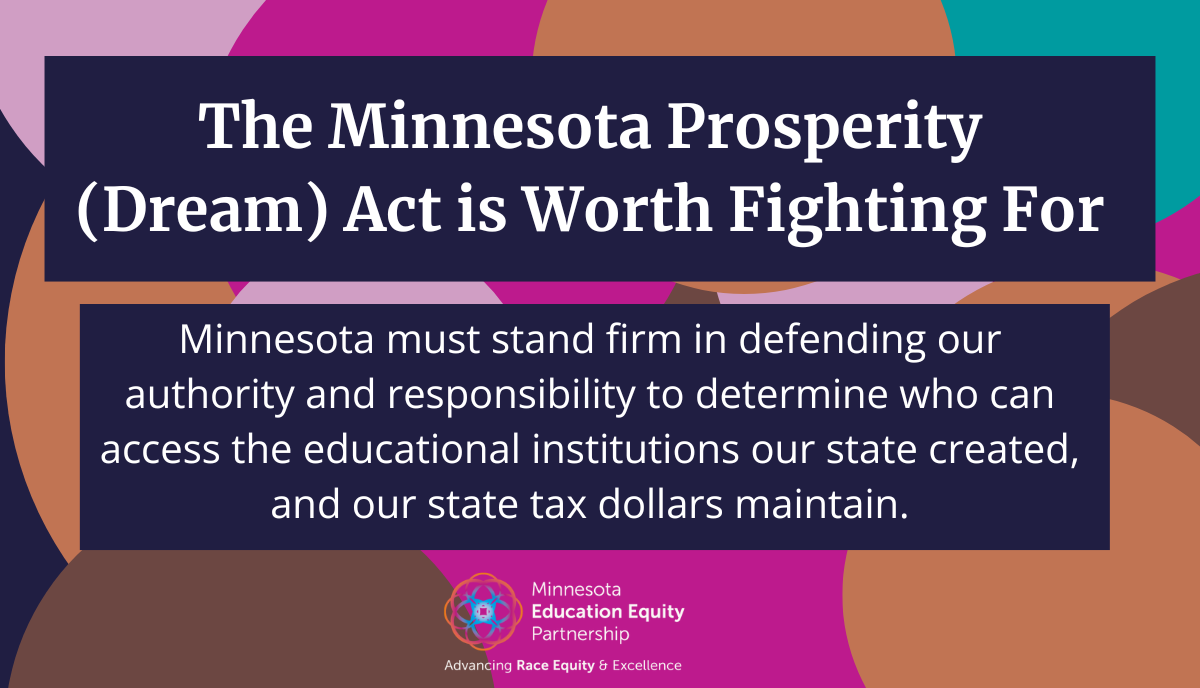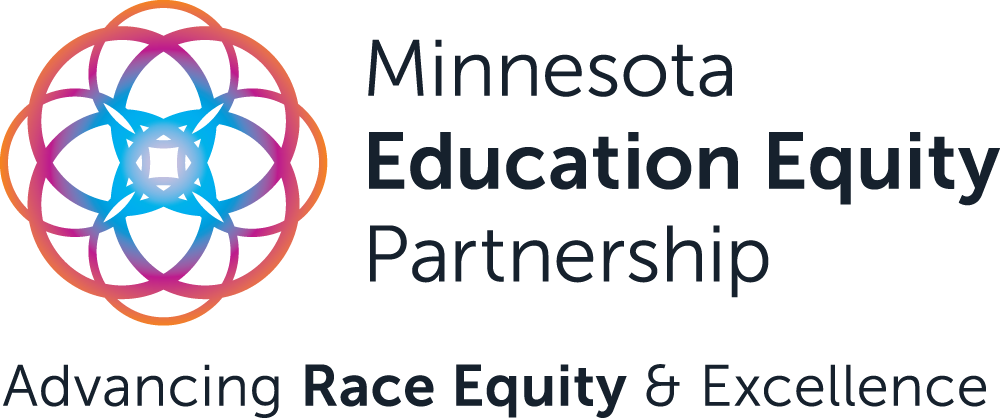
The Minnesota Prosperity (Dream) Act is Worth Fighting For
By Hon. Carlos Mariani Rosa
MnEEP Executive Director
The U.S. Department of Justice recently announced legal action against Minnesota, seeking to block implementation of a state law that expands access to higher education for immigrant students who graduate from our high schools.
As the author of Minnesota’s 2013 Prosperity (Dream) Act, I want to explain why this federal overreach is dangerous. It is an intrusion into a space that has always belonged to the states— determining who has access to our state-created, taxpayer-maintained public colleges and universities.
The issue here is not citizenship, even though the Department of Justice wants to frame it that way. The real issue is residency. It’s critical to note that states have always determined who qualifies as a resident for tuition purposes, just as we do for things like driver’s licenses, property taxes, and voting.
The Prosperity Act is a state law that defines residency in this context, grounded in both solid legal footing and historic social purpose. It uses the same principle that has governed in-state tuition for decades, and clearly spells out what counts as Minnesota residency through clear, legal criteria.
Minnesota must stand firm in defending our authority and responsibility to determine who can access the educational institutions our state created, and our state tax dollars maintain.
We must ensure all Minnesota students, including undocumented immigrant students, can access the education they have earned in our state and build the equitable, just future they deserve.
A System Built for Minnesota, by Minnesota
Minnesota built its higher-education system to serve Minnesotans. We have intentionally designed a broad and responsive network that includes a constitutionally created land-grant university with five campuses and a statewide MinnState system, made up of seven universities and 26 community and technical colleges operating across 58 campuses.
These campuses were built to reflect our state’s priorities and serve Minnesota’s unique civic, social, economic, and geographic needs.
The U of M Crookston campus, for example, supports the sugar beet industry in northwest Minnesota. Southwest Minnesota State aligns with the corn-based farming economy of that region. U of M Morris responds to rural demand for liberal arts education, with a particular focus on providing free tuition to American Indian students. Bemidji State serves our timber and mining regions. Metro State and Minneapolis College prioritize access for students of color and immigrants in those communities.
Building on these longstanding regional priorities and commitments to equity, the Minnesota Legislature has ensured that our higher education system includes pathways for immigrant students—especially undocumented residents who completed their K–12 education here—in alignment with the 1982 U.S. Supreme Court decision, Plyler v. Doe, which guarantees access to public education regardless of immigration status.
A Strategic Investment in Minnesota
When we passed the Minnesota Prosperity Act in 2013, it was not only because it was morally just and legally sound, but because it was a smart investment in our state’s future.
Minnesota faces a rapidly aging population and a shrinking workforce. Our long-term economic success depends on a strong, educated labor force with high earning potential. Immigrant communities are essential to that future.
We recognized the need to maintain a strong base of educated residents whose higher earning potential would sustain our prosperity. With this reality, it was clear we needed to increase our workforce, and immigrant communities were an essential source of that growth.
We also knew that expanding higher-ed access would reduce high school dropout rates, boost graduation rates, and decrease long-term reliance on social services, and by providing state financial aid, we could help students overcome the affordability barriers made worse by their exclusion from federal Pell Grants
Additionally, the bipartisan 1986 federal Immigration Reform and Control Act (IRCA) showed that immigration reform could bring thousands of undocumented Minnesotans into legal status, allowing them to contribute more openly to our state’s economic and social success.
The Case for Fairness—and the Law That Supports It
There were other important reasons to pass the Prosperity Act, foremost among them fairness. Most of the students it supports came to the U.S. as children. For many, Minnesota is the only home they’ve ever known. They’ve grown up playing on our school sports teams, joining clubs, and building community alongside their classmates. They contribute meaningfully to our faith communities, businesses, and civic life.
Denying them access to higher education wouldn’t just be unfair—it would go against the very values Minnesota stands for.
But while fairness was the guiding principle, the policy also had to navigate legal realities. A 1996 federal statute threatened to strip states of in-state tuition autonomy by forcing them to extend in-state tuition rates to all U.S. citizens if they offered it to undocumented students based on residency alone. The clear intent was to make inclusive policies financially impossible and force states into abandoning them.
Minnesota didn’t take the bait. Instead, in accordance with our state’s values, we responded thoughtfully and lawfully.
Our Prosperity (Dream) Act was modeled after Texas’s pioneering 2001 bipartisan law—the first in the nation to pave a legal and just way forward.
Rather than relying solely on residency status, Minnesota added specific educational criteria to determine who is eligible for in-state tuition: students must attend a Minnesota high school for at least three years, graduate or earn a GED here, register with Selective Service if required, and apply for lawful immigration status if a federal process exists.
This approach matters. We did not violate federal law in drafting the Prosperity Act; we worked around the federal statute’s coercive and punitive design.
Our law does what in-state tuition laws have always done: define residency, which is and has always been a state function. The DOJ knows this, and that’s why their argument isn’t about legality. It’s about politics.
There is no federal law that bars undocumented students from attending public colleges and universities. There is no constitutional prohibition.
Let’s be clear about what is really happening here: The DOJ is gaslighting the public, twisting long-standing practices into a manufactured grievance.
This is a racist administration using immigrant youth as a political target and weaponizing fear to distract from their broader attacks on public institutions and civil rights.
Their so-called legal challenge isn’t about fairness or law. It’s about control. And they are trying to force states into submission by redefining what they’ve always had the right to do.
Minnesota cannot let them succeed.
Minnesota Must Affirm Its Commitment to Equity and Opportunity
Minnesota’s Prosperity Act stands on firm legal ground. It upholds constitutional rights, avoids basing eligibility solely on residency, respects the federal prohibition on non-citizen access to federal financial aid, and aligns with the fact that no federal law bars states from admitting undocumented students to public colleges.
But legality alone isn’t the point.
The Act advances a powerful and practical vision for our state. It reflects who we are: a place that invests in people, upholds fairness, and refuses to be bullied by a federal administration bent on fear and control.
Minnesota has always had the right to set in-state tuition. We’ve always had the responsibility to define residency. And we’ve always known that a stronger Minnesota is one where every student, including undocumented students, has the right to contribute, succeed, and belong.
We cannot let federal overreach stand in the way of our state’s future. Minnesota must stand in defense of our values, our laws, and our commitment to our diverse communities.
This is not just good policy; it is a reflection of who we are. And it is absolutely worth fighting for.

